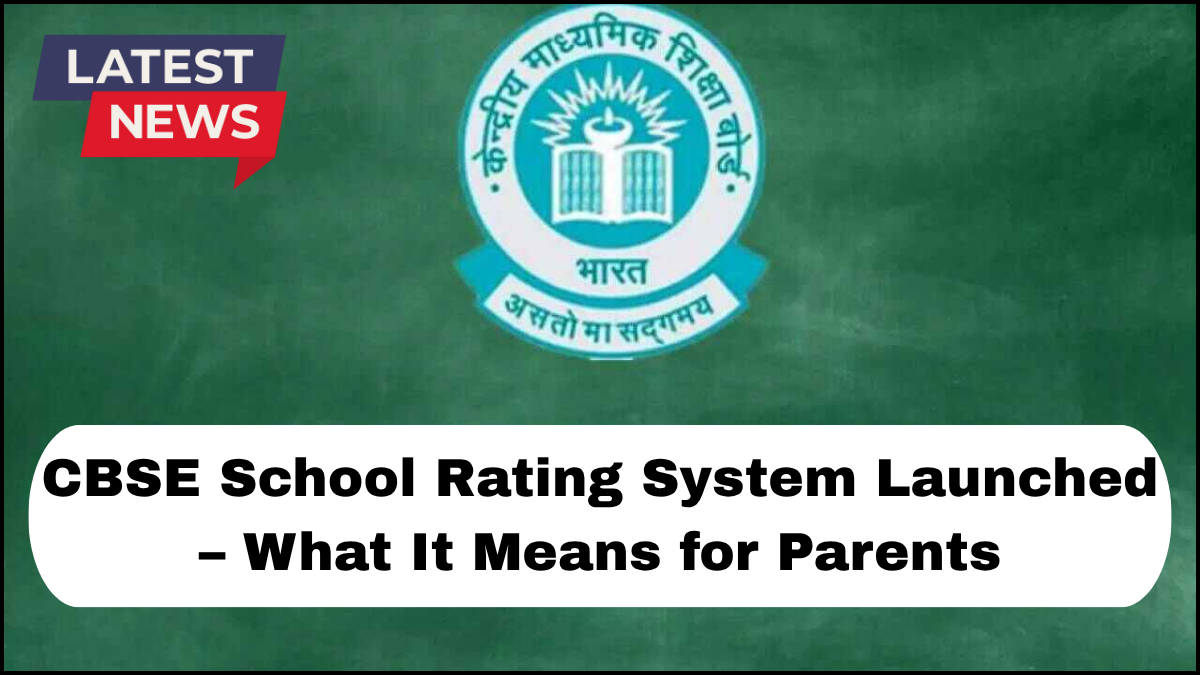The Central Board of Secondary Education (CBSE) has officially launched its long-anticipated CBSE School Rating system, marking a major shift in how schools across India are evaluated and held accountable. This new framework is designed to bring greater transparency, drive educational quality, and empower parents with reliable data to make better-informed decisions about their children’s education.

What Is the CBSE School Rating System?
The CBSE School Rating system is an institutional self-assessment and external review initiative that evaluates affiliated schools across various performance indicators. Unlike past approaches that focused mainly on academic results, the new system takes a comprehensive view of a school’s overall functioning.
The ratings are categorized across several levels, from Level 1 (lowest) to Level 5 (highest), providing a more detailed view of school performance. This system aligns with the CBSE’s goal to foster continuous improvement and maintain uniformity in education standards across the country.
Key Pillars of the New Framework
The new framework is structured around a set of carefully selected performance metrics. These include:
-
Academic Excellence: Evaluates student performance in board exams and internal assessments.
-
Faculty Quality: Assesses teacher qualifications, training, and teaching methods.
-
School Infrastructure: Considers the quality of facilities, classrooms, labs, libraries, and safety measures.
-
Student Well-being: Looks into emotional and mental health support, inclusive education practices, and co-curricular programs.
-
Innovation & Best Practices: Rates efforts in integrating technology, project-based learning, and unique pedagogical approaches.
Each of these metrics contributes to a holistic evaluation, ensuring that schools are not just exam factories but nurturing spaces for overall development.
Why This Matters to Parents
For parents, the CBSE School Rating system provides a credible, standardized benchmark for comparing schools. Previously, parents had to rely on word-of-mouth, marketing brochures, or personal visits to judge a school’s merit. This system changes the game.
-
Clarity and Confidence: Parents can now make decisions based on verified data rather than assumptions or limited exposure.
-
Accountability: Schools are more likely to maintain consistent quality to protect or improve their ratings.
-
Better Conversations: The availability of standardized ratings helps parents ask the right questions during school visits or interactions.
In short, it levels the playing field and reduces the guesswork.
How Schools Are Reacting
Schools across the country are responding with a mix of enthusiasm and urgency. Those already performing well see the system as validation, while others are ramping up efforts to improve infrastructure, hire trained staff, and integrate modern teaching practices.
Additionally, the CBSE School Rating system is expected to push institutions toward innovation. Schools that once focused narrowly on academic results are now investing in areas like mental wellness programs, eco-friendly campuses, and creative extracurricular opportunities to improve their scores.
Implementation and Timeline
CBSE has rolled out the system in a phased manner, starting with pilot programs in selected regions. Full-scale implementation is expected over the next academic year. Schools will need to undergo internal assessments, followed by CBSE’s external audits.
To ensure accuracy and fairness, CBSE has developed a digital portal where schools can upload evidence against each evaluation parameter. The system then generates scores through automated algorithms, which are later validated by field assessors.
How Parents Can Access the Ratings
Once fully operational, ratings will be publicly available on the official CBSE website. Parents will be able to:
-
Search for schools by name or location
-
View detailed scorecards across different metrics
-
Compare multiple schools side-by-side
This feature will be especially helpful for families relocating to new cities or seeking admission for their children in higher classes.
Final Thoughts
The CBSE School Rating system is more than just a scorecard—it’s a structural shift in how educational quality is monitored and perceived in India. It provides schools with a roadmap for growth and gives parents the insights they need to make informed choices.
By holding institutions to higher standards and offering transparency, CBSE’s new framework sets the tone for a more accountable and student-focused education ecosystem.
FAQs
Q1. Is the CBSE School Rating system mandatory for all schools?
Yes. All CBSE-affiliated schools will be required to participate in the rating system as part of the board’s compliance and quality control process.
Q2. Will these ratings affect school affiliation status?
Not directly. However, consistently poor performance might prompt the board to issue warnings or conduct detailed inspections.
Q3. How often will the ratings be updated?
Ratings are expected to be reviewed and updated annually, allowing schools time to implement improvements.
Q4. Can schools contest their ratings?
Yes. CBSE allows schools to appeal or provide additional documentation if they believe their rating doesn’t accurately reflect their performance.
Q5. Are private and public schools evaluated differently?
No. The rating system is standardized across all CBSE-affiliated schools, whether private or government-run.
click here to learn more